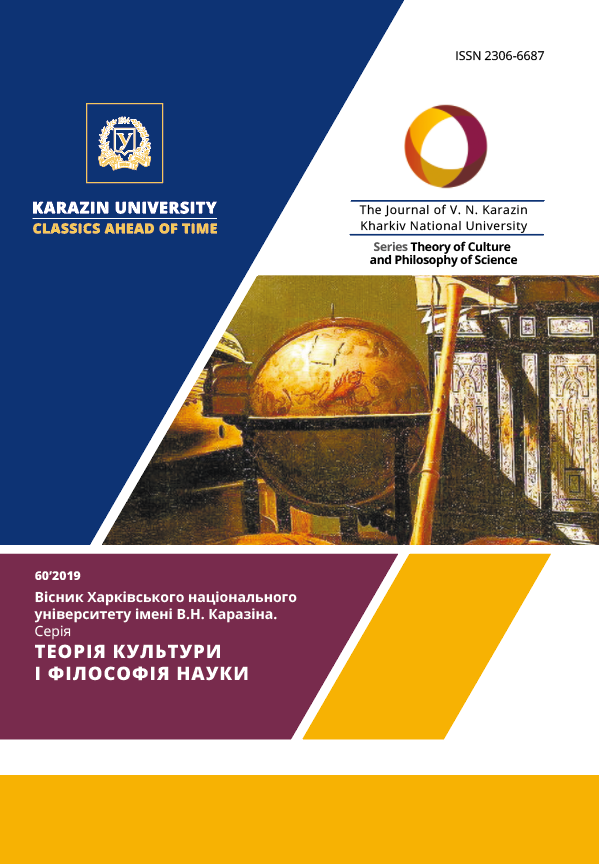Social –axiologic analysis of the phenomenon of lie
Abstract
The article deals with the axiological aspects of lying as a social phenomenon. A special attention is paid to the impact of sociocultural transformations on the evaluation of the phenomenon of lying. An example of such an influence is the accentuated negative attitude towards hypocrisy, insincerity, conventions in social communication, which arose during the modernization of society and was caused by such factors as the development of critical thinking, the interiorization of human spiritual life as well as the individualization of human activity.
Lie becomes possible because of voluntary, reasonable and sensual elements in human. The voluntary element represents itself in aspiration of corrigating the reality in own interests, the reasonable in understanding the real and possible, true and probable, the sensual in ability to hypocrisy nad emotional influence onto recipients. Ambiguity of lie consists in that it begets not only blame but also admiration for that, who lies, demonstrates thereby self-control, insolence, resourcefulness, artistic abilities.
In the process of the traditional society modernization the level of distrust grows that is explained by traditional social ties destruction. The rationalization of culture that widens subject field of diubt becomes an important factor. There changes the attitude to truth that prescribes severe criteria for authority, traditions, checking with time are not sufficient more.
Downloads
References
Гусейнов А. А. Что говорил Кант, или Почему невозможна ложь во благо? / А. А. Гусейнов // Логос. – 2008. – № 5(68). – С. 103–121.
Дубровский Д. И. Проблема добродетельного обмана / Д. И. Дубровский // Философские науки. – 1989. – №6. – С.73–84.
Зимбули А. Е. Ложь: нравственно-оценочные аспекты / А. Е. Зимбули // Общество. Среда. Развитие (Terra Humana). – 2012. – № 3. – С. 187 – 192.
Кант И. О мнимом праве лгать из человеколюбия / И. Кант // Трактаты и письма. – Москва : Наука, 1980. – С. 292–297.
Карабыков А. В. Проблема лжи в трудах средневековых христианских мыслителей / А. В. Карабыков // Вестник Томского государственного университета. Философия. Социология. Политология. – 2013. –№ 2 (22). – С. 177–185.
Карпенко А. С. Ложь / А. С. Карпенко // Новая философская энциклопедия : в 4-х т. / науч.-ред. совет: В. С. Степин, А. А. Гусейнов, Г. Ю. Семигин. – Москва : Мысль, 2010. – Т. 2. – С. 447–448.
Ле Гофф Ж. Цивилизация средневекового Запада / Ж. Ле Гофф. – Москва : Прогресс, 1992. – 376 с.
Ницше Ф. Черновики и наброски 1887–1889 гг. / Ф. Ницше // Полное собрание сочинений : в 13-ти т.– Москва : Культурная революция, 2006. – Т. 13. – 656 с.
Паскаль Б. Мысли / Б. Паскаль. – Москва : Изд-во имени Сабашниковых, 1995. – 480 с.
Разинов Ю. А. Парадоксы истины и лжи в философии Ф. Ницше / Ю. А. Разинов // Mixtura verborum’ 2014: жизнь в параллельных мирах : философский ежегодник / под общ. ред. С. А. Лишаева. – Самара : Самарская гуманитарная академия, 2015. – С. 40–60.
Секацкий А. К. Онтология лжи / А. К. Секацкий. – Санкт-Петербург : Изд-во СПбГУ, 2000. – 119 с.
Соловьев В. С. Ложь / В. С. Соловьёв // Энциклопедический словарь Ф. А. Брокгауза и И. А. Ефрона : в 86-ти т. – Санкт-Петербург : Типо-Литография И. А. Ефрона, 1896. – Т. 34. – С. 911.
Чекушкина Е. Н. Феномен лжи (обмана). Философско-этический анализ [Электронный ресурс] / Н. Е. Чекушкина. – Режим доступа : http://onto.ru/public/publications/meneghetti_2012/chekushkina.
Шалютин Б. С. Человек лгущий [Электронный ресурс] / Б. С. Шалютин – Режим доступа : http://anthropology.ru/ru/text/shalyutin-bs/chelovek-lgushchiy.




